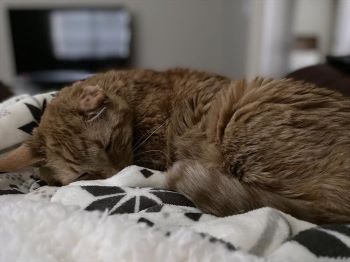Geriatric Pet Care - Emily Doon

Nacho indulging in his favorite pastime activity. Photo courtesy of Emily Doon, veterinary student class of 2025
A spunky orange kitten came crashing into my world when I was six and little did I know that he would become my best friend for the next 18 (+?) years of my life. “Nacho Cheese” was introduced to my first-grade class at our first “show-n-tell” of the year. His soft kitten fur, striking orange stripes, and abundant energy stole the hearts of everyone in that classroom, my heart being the one he affected most.
Nacho lived a vibrant and exciting adolescent life in a small town out in the country. He spent his time terrorizing anyone who dared to walk past his attack post (strategically set up behind a corner in the hallway), breaking out of windows during the cool summer nights, exploring the roof a few too many times, and testing out the nine-lives theory with a jump from a balcony. He even endured the stress of a new crazy pup who eventually gave him an ear hematoma from one too many wrestling matches.
Fast-forward roughly 18 years and a cross-country move and here he is taking his late morning nap as I prepare for my second year of veterinary school. Only now the crazy orange cat with 3 a.m. zoomies has aged into a sleepy, stiff, geriatric cat whose favorite time of the day is getting his daily treat (it's actually a joint supplement, but don't tell him that!). With his recent stage 3 kidney disease and heart arrhythmia diagnosis, I'm afraid our time together is waning.
Caring for a geriatric pet comes with a new set of challenges, but there are many practical things that dedicated and loving pet owners can do to improve the life of their aging pet.
Make mealtime easier – Older pets are at higher risk of developing dental disease, which can make eating dry food a little more difficult or painful. Talk to your veterinarian to see if it's a good time for a dental cleaning. If your pet has a history of poor kidney, liver, or heart function they may not be a good candidate and alternative interventions may be explored. Some cats and dogs may prefer to switch to wet food to ease any discomfort in their mouth. Remember to gradually introduce the new food by slowly mixing it into their old food to avoid any gastrointestinal upset.
Improve access to everyday needs – You may notice your pet moving a little slower than usual, which could be due to arthritis, a common old pet disease. By elevating their food and water bowls, placing a water bowl close to their bed, getting a litter box with lower sides, and putting their bed in a quiet and accessible area, you can make sure they are staying hydrated and have easy access to the necessities in life.
Openly communicate with your veterinarian – When caring for a geriatric pet it is important to keep up with their routine veterinary care (physical exams, blood work, etc.) to monitor for any health changes. It is also important to have those open, honest, and sometimes difficult conversations with your veterinarian about quality of life. Great resources are out there to help you keep a tally of how your pet is doing and warning signs to look for that might indicate their quality of life is no longer as good as it should be. Two of my favorite sources are:
So basically, what I am saying is treat your old guy like royalty. Enjoy those 5 a.m. wakeup calls when someone's whiskers brush across your face or a warm, slimy tongue gives you a big kiss. Let them curl up in a spot they've never been allowed to nap in before. Sneak them an extra treat every now again. Be thankful for all the moments and memories you have shared together and cherish every good day they have.
Nacho has been my buddy from age six; I am now 24. I know our days together are drawing near the end, but in the meantime, he will be getting all the pets, snuggles, and closely supervised wilderness (okay, patio) adventures his little old heart desires.